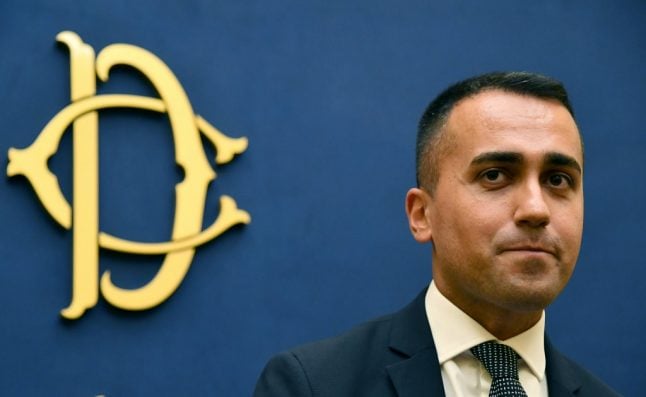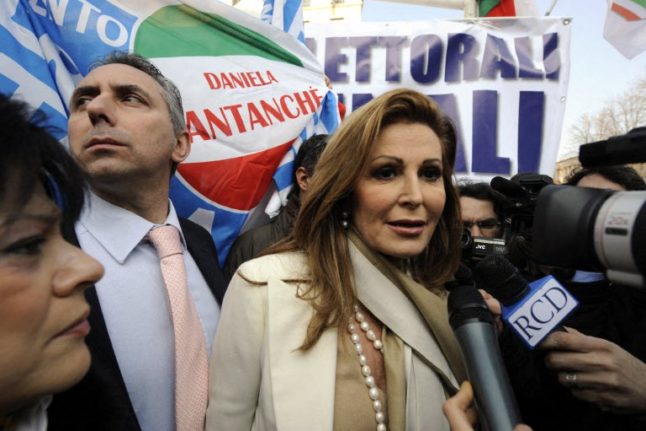His boyish, clean-cut looks hide a stubborn streak: the 33-year old was deputy prime minister in the outgoing government and had been threatening to torpedo the new tie-up with Italy's centre-left Democratic Party (PD) if he was demoted.
Derided by critics as a self-centred robot, he was persuaded to accept the trophy role of foreign minister instead. After the cabinet was officially sworn in on Thursday morning, he is the youngest foreign minister in Italy's postwar history.
READ ALSO: Here is Italy's new cabinet in full
Di Maio led his party to astonishing electoral success last year, propelling the grass-roots mavericks to the forefront of Italy's political scene for the very first time as it signed a contract to govern with the nationalist League.
The young Neapolitan's willingness to jump into bed with both the League and the PD — who Five Star has spent years ferociously criticizing — has caused critics to accuse him of putting power before policies.

Luigi Di Maio (L) shakes hands with Prime Minister Giuseppe Conte as he is sworn in as foreign minister. Photo: Andreas Solaro/AFP
'Courageous and ambitious'
The country's fresh start with a left-leaning, pro-European coalition was undermined somewhat by Di Maio's insistence that he did not regret anything done during the 14 months of coalition with the far-right.
On Wednesday he said the new government would be “courageous and ambitious” and “pick up where we left off”. He said he would focus particularly on Africa, the hot-button issue of migration, and Italy's rapport with emerging economies.
His appointment was met with a mixed reaction in Italy, with some Twitter users saying Di Maio did not speak a word of English. And he will have to pull out all the charm stops with neighbouring France, after ruffling feathers in Paris in February by travelling to meet “yellow vest” anti-government protesters.
The Five-Star Movement's Luigi Di Maio has just been named foreign minister. What about his party's ties to Russia? China? Europe? France? He's the guy who made a surprise visit to the Yellow Vests this year, provoking the worst diplomatic crisis between France & Italy since WW2
— Rachel Donadio (@RachelDonadio) September 4, 2019
I’m puzzled why Italy’s 5-Star chief Di Maio took foreign minister job in new govt. He’ll have little power (the PM really decides foreign policy) and will be isolated and distracted from domestic decision making and running his party. Why not stay out of govt like the PD’s head?
— gavin jones (@gavinjones10) September 4, 2019
Di Maio's election as party leader in 2017 represented an important shift for Five Star — from the frantic conspiratorial ranting of iconoclast co-founder and stand-up comedian Beppe Grillo to a new measured, reassuring style. The southern upstart began life as a Grillo disciple, but became increasingly irritated by the loud-mouthed comic's attempts to direct the Movement from behind the scenes during the political crisis.
Di Maio has been involved with the M5S since its creation in 2009, campaigning against corruption and the European Union while promoting political transparency and direct democracy.
Following the February 2013 election, Five Star won a spectacular quarter of the vote and Di Maio, then aged just 26, was among 108 M5S candidates elected to the Chamber of Deputies — the lower house of the Italian parliament. A month later, he became the chamber's youngest ever deputy speaker.
'Reassuring to mums'
His elevation to party leader via an online vote, in which Di Maio's competitors were relative unknowns, prompted many commentators to brand his election as a coronation organized by “puppet-master” Grillo.
Others questioned his political authenticity, accusing him of being a hybrid creation of Grillo and consultants. “Di Maio was created to be moderate, reassuring to mums,” said Italian political journalist Jacopo Iacoboni.
The mums, however, were more drawn to ranting strongman Matteo Salvini, head of the anti-immigrant League, who quickly outstripped Di Maio in popularity thanks to his “Italians first” message and relentless social media skills. Di Maio's party also slumped in the polls and its deal with the PD was seen as a bid to avoid a potentially disastrous election.
ANALYSIS: How Matteo Salvini lost his gamble to become Italy's PM – for now
The new foreign minister was born on July 6th 1986 into a well-to-do family in Avellino near Naples. His father Antonio had a small construction business and was an activist for the now-defunct neo-fascist party Italian Social Movement, while his mother Paola was a Latin teacher.
The eldest of three children, Di Maio studied computer engineering at Naples University, later switched to law and never completed a degree. According to a CV posted on M5S's website, he founded his own web and social media marketing business while studying, as well as working on video projects.
A focus on marketing and presentation helped the M5S shift its tone on key issues with Di Maio at the helm. The M5S had consistently called for Italy to leave the single currency eurozone, but Di Maio has moderated their stance, making conciliatory overtures to the bloc which are set to continue under the tie-up with pro-Europe PD.
By AFP's Ella Ide



 Please whitelist us to continue reading.
Please whitelist us to continue reading.
Member comments